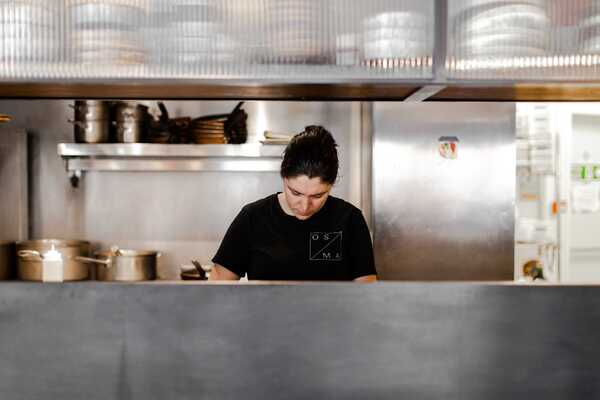Time to Brexit-proof your business
With so much uncertainty still surrounding the details of the UKâs exit from the EU, whenever it eventually happens, itâs important for the hospitality and foodservice sector to do everything possible to mitigate the impact, advises buying specialist Lynx Purchasing.
âDespite concerns over the impact of a no-deal scenario, including both the supply chain implications and the availability of labour, there are still steps that every operator can take to âBrexit-proofâ their business, to an extent at least,â says Rachel Dobson, managing director of Lynx Purchasing.
âWeâre already working with many of our customers to help put the measures in place needed to help them to trade through what will clearly be a challenging market for some time to come.â
The headline CPI inflation rate increased to 2.7% in August 2018, up from 2.5% in July, showing the continued squeeze on consumer spending. The cost of meals eaten out of home increased by 2.8% year-on-year, with restaurant meals up 2.7% and takeaway food up 3.2%.
The issues facing operators are flagged up in the autumn 2018 edition of the Lynx Purchasing Market Forecast, which offers operators an in-depth look at pricing and product trends over the coming months, using exclusive data gathered from the range of suppliers who work with Lynx Purchasing. Advice for operators includes:
Protect the supply chain and product availability wherever possible by using suppliers who source from either the UK or from outside the EU. Where itâs not possible to source British products, explore non-European substitutes.
Develop recipes that donât rely on specific products from a named supplier or a particular country, and design menus that can be changed quickly and cost-effectively.
Build flexibility into the companyâs systems, so that chefs and managers can respond to changes in supply, availability and prices.
Stay informed about whatâs happening. Look behind the âdoom and gloomâ headlines to the updates from supply chain specialists and trade associations, and ask suppliers to provide up-to-date regular market information. Good intelligence will help to maintain margins in the face of all the uncertainty, and to keep the business competitive and profitable.
As caterers plan Christmas menus, there are a number of product areas spotlighted in the latest Market Forecast.
Poultry
Turkey prices are expected to be volatile this year, reflecting the wider poultry market. Problems in Brazil, a major supplier to the global poultry trade; expected increases in feed costs and trade arrangements; and high demand in Europe will all have an impact on poultry prices in the run-up to the festive period.
Beef
Prices for beef, also very popular on festive menus, have moved steadily upwards this year after the cold winter followed by the hot, dry summer hit feed prices. Lower demand for forequarter cuts should make them better value than topside and silverside, while steak prices will remain firm.
Fish
Native wet fish prices have remained fairly stable thanks to continued good landings by the UK fishing fleet. However, salmon is a festive staple, and while North Sea salmon prices are down from their highest point this year, they are still well above 2017 levels. Forecasts for Norwegian salmon this year are relatively low due to very cold water temperatures limiting growth.
Dairy
Dairy inflation saw UK butter prices increase by 50% in the first half of the year, and while prices have stabilised to an extent, they are still higher than for what many operators will have budgeted. Cream and full-fat milk have also seen prices increase.
Eggs are also expected to continue to increase in price as producers pass on higher feed costs.
Potatoes
This year potato planting was delayed by the spring freeze, and hopes that the crop would recover were given another knock as the long, hot dry summer continued. Both potatoes and potato products are likely to see higher prices this autumn and winter.
Vegetables
Root vegetables such as carrots and parsnips are also affected, with yields down and quality expected to be reduced. The onion harvest will be down and large onions will be harder to source. Sprouts will also be affected this year.
Alcohol
The hot summer across Europe was good news for grape producers, raising expectations that wine will generally be in good supply and high quality. For the same reason, a good crop of apples will benefit cider-makers. In contrast, high wheat prices will push up wholesale prices for beer.
Dobson adds: âThe Market Forecast includes plenty of ideas for operators to overcome pricing challenges, for example: substituting alternatives to butter in recipes; using menu descriptions such as âserved with seasonal vegâ to maintain flexibility; and being ready to switch supplier contracts to get the best prices on commodities such as cooking oil.
âWhile the big picture on Brexit may be daunting, there are plenty of small measures operators can implement that can add up to a big difference on the bottom line.â
About Lynx Purchasing
As purchasing professionals, Lynx works with leading suppliers in the hospitality and catering industry. These include wholesalers, specialist fresh food suppliers, catering equipment providers, utilities, and specialist service providers such as telecom, business rates consultancy and waste management.
A free copy of the autumn 2018 Market Forecast, as well as the free Lynx Purchasing The Seven Habits of Highly Effective Purchasing Teams guide, can be downloaded from the website www.lynxpurchasing.co.uk.
Keep up to date with Lynx Purchasing through Twitter and Facebook @lynxpurchasing, or for more information call 01274852171 or email: savings@lynxpurchasing.co.uk.
















